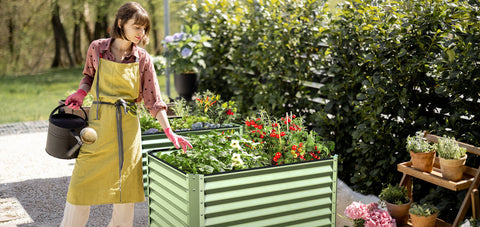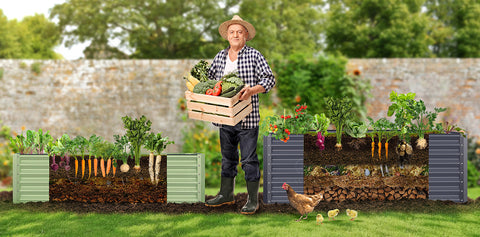Gardens are not just about adding incredible appeal and increasing your DIY skills. Gardening can also improve your health and put you in an environment and activities conducive to physical and mental health. Research around the world has directly linked the impact of gardening to a higher quality of life in urban and rural areas, benefiting everyone from children to the elderly.
The following content also has some reference value for garden beds.
1. Gardening can relieve stress
A Dutch study tested cortisol, a natural steroid that helps your body cope with stress, and found that gardening after a stressful event can relieve stress more than reading. (Don't worry, research shows that reading can also reduce stress!) Family gardeners report that psychological benefits, such as relieving stress, are more important to them than cultural ties or economic interests, regardless of the type or amount of gardening activities they engage in. This is not just gardening; Bacteria in the soil may also help fight stress. The same bacteria are also believed to have antidepressant effects and can build a strong immune system.

2. Gardening is also exercise
Activities such as carrying flower pots, digging holes, stretching to reach weeds, and pushing lawn mowers can involve every muscle of your body. The Centers for Disease Control and Prevention classified gardening as a medium intensity sports activity and pointed out that it can burn more than 300 calories per hour, which is about the same as playing golf and holding a club while walking. More substantial yard work, such as chopping firewood or hauling heavy plastic film bags, will burn more than 400 calories. One study suggests gardening may help offset age-related weight gain. There are other tangible physical benefits, such as increased flexibility and hand strength. In addition, after all the gardening, you may sleep better.
3. Gardening hinders dementia
This is not only a physical exercise, gardening is also good for your brain, especially to prevent the onset of dementia. Gardening enhances cognitive function. A study found that it may reduce the risk of dementia by 36%.

4. Gardening helps fight against chronic diseases such as heart disease and diabetes
You know that plants need sunshine, but do you know that your body also needs sunshine? Like other outdoor leisure activities, gardening can provide dual effects of healthy exercise and sun exposure. Proper sun exposure is the most effective way to obtain vitamin D, which affects more than 1000 different genes and almost every tissue in your body, affecting everything from metabolism to the immune system. Calciferol is associated with positive effects in type 2 diabetes, heart disease, bone health and depression. Your gut may also feel good because vitamin D is believed to help regulate gastrointestinal discomfort. Of course, it is important to remember to take precautions to spend time safely in the sun.
5. Gardening connects people
Gardening connects people to the wider community and combats the negative effects of loneliness on health. This may simply mean interacting with individuals in the local gardening center or sharing gardening skills and successful experiences with an online community before digging a home garden. Gardening has more direct benefits in places like community gardens. Social ties and support networks can be formed. In an urban environment, this may have additional impacts, as many residents may suffer isolation and lack of social support. A study found that horticulture enhances racial interactions in these environments as well.

6. Gardening can improve your mood and self-esteem
Just being in nature is good for your health, and the effects of participating in it include recorded emotional enhancement. Gardening increases motivation and optimism, and has been linked to fighting depression and other mental disorders. With these good results, spending time in the soil will lead to higher self-esteem for adults and children with behavior problems. The research on... shows that emotional health is related to daily activities, like walking, shopping and dining out, and gardening has been ranked among the five activities that provide happiness and meaning. The same study showed that women and low-income participants felt the most positive impact.
7. Gardening helps you eat a healthier diet
Choosing healthy food isn't easy, but gardening can help. The growers of fruits, vegetables and herbs also have an additional benefit, that is, easy access to nutritious food (and allow you to control what pesticides or fertilizers you use) In addition, people who grow vegetables are more likely to eat them. One study found that children were more likely to eat their own fruits and vegetables, while another found that the increase in food knowledge was related to youth gardening. In addition to nutritional benefits, vegetable growers, in particular, reported more positive emotional impacts than those engaged in other types of home gardening.









